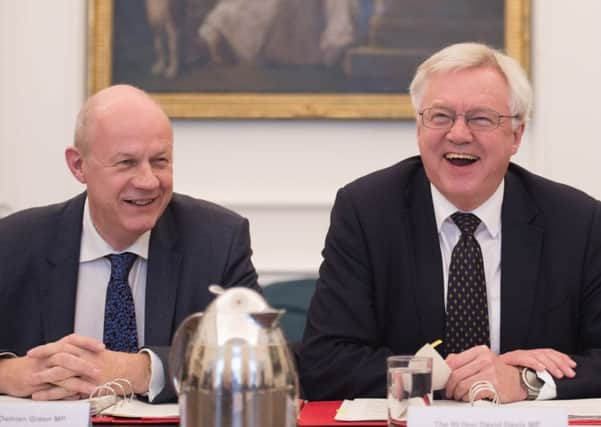Brexit war cabinet '˜fails to agree position on UK-EU trade'


The Cabinet ministers most closely involved with Brexit talks began discussing options for the future UK-EU relationship in a Downing Street meeting which lasted a little more than an hour and a half.
Brexiteers such as Boris Johnson, Michael Gove and Liam Fox, alongside Gavin Williamson, who backed Remain in the referendum, were understood to be vocal on the need to “diverge” from EU regulations.
Advertisement
Hide AdAdvertisement
Hide AdIt is believed “soft” Brexit backers such as Chancellor Philip Hammond and Home Secretary Amber Rudd leaned further towards “alignment” with Brussels rules to maintain close ties with the EU in the future.
Ministers did not agree a position but there was discussion of the potential for “gradual divergence” - a step-by-step move away from EU laws after Brexit and the conclusion of a subsequent implementation period in 2021.
Further talks on the future relationship are planned for Cabinet European Union Exit and Trade Committee meetings in the new year.
The meeting came as a senior adviser to EU chief negotiator Michel Barnier warned that Britain could not pursue “sector-by-sector” participation in the European single market.
Stefaan De Rynck also rejected a “buffet-style” transition away from EU membership “where one picks and chooses the bits one likes”, in an event at Chatham House in central London.
Mr Barnier has also made clear Britain will not be able to “cherry-pick” advantages of different trading models with the EU.
He told Prospect magazine: “We won’t mix up the various scenarios to create a specific one and accommodate their wishes, mixing, for instance, the advantages of the Norwegian model, member of the single market, with the simple requirements of the Canadian one.
“No way. They have to face the consequences of their own decision.”
Advertisement
Hide AdAdvertisement
Hide AdBut Theresa May’s official spokesman made clear her commitment to pursuing a bespoke deal away from pre-existing models such as Norway-style membership of the European Economic Area (EEA) or a Canadian-style free trade deal on goods.
He told a regular Westminster briefing: “We believe that we can secure an ambitious deal with the EU that works for the UK and for the European Union and that we come at this from a unique perspective in the sense that we already have a strong relationship with the European Union from which to build upon.”
Foreign Secretary Mr Johnson used an interview with the Sunday Times to make his position clear - that mirroring Brussels laws after Brexit would leave the UK a “vassal state” of the EU.
Brexit Secretary David Davis has described his vision of the deal as “Canada, plus, plus, plus” - taking in not only trade but services and co-operation in other areas.
In a Commons statement on Monday, Mrs May will tell MPs the UK will seek to sign trade deals with countries around the world despite potentially being bound by EU rules for around two years after Brexit.
The PM will say even though the UK is leaving the single market and customs union in March 2019, she wants “access to one another’s markets” to continue “as now” during an implementation period.
The EU’s guidelines say that during any transition period the UK would have to comply with the bloc’s trade policy - preventing it from striking its own deals with other countries.
But Mrs May will say the UK wants to sign agreements which would come into force after the “strictly time-limited” period has ended.
Advertisement
Hide AdAdvertisement
Hide AdEarlier, the PM’s official spokesman stressed her commitment to “maintaining and where possible enhancing” workers’ rights after Brexit.
He appeared to dismiss reports that ministers would use Monday’s meeting to demand an end to the EU Working Time Directive, which limits the working week to 48 hours.
“I wouldn’t anticipate it’s part of the cabinet discussion,” he told a regular Westminster briefing.
